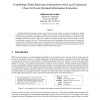Free Online Productivity Tools
i2Speak
i2Symbol
i2OCR
iTex2Img
iWeb2Print
iWeb2Shot
i2Type
iPdf2Split
iPdf2Merge
i2Bopomofo
i2Arabic
i2Style
i2Image
i2PDF
iLatex2Rtf
Sci2ools
AAAI
2008
2008
Combining Global Relevance Information with Local Contextual Clues for Event-Oriented Information Extraction
Existing Information Extraction systems tend to focus on a tight window of context surrounding the desired information to be extracted. This leads to a number of shortcomings in their performance: (a) reduced coverage because of omitted extractions embedded non-event-specific contexts, (b) incorrect extractions in irrelevant context that appear to be relevant "locally", and (c) poor accuracy of extraction patterns or rules, which are unable to account for the global relevance of the text. This research addresses the shortcomings of these systems by introducing a "relevant region" identification phase, used in combination with an extraction system constructed from a number of weaker local contextual clues. This two-phase strategy effectively combines global relevance information with local contextual evidence to constitute a competent Information Extraction system.
AAAI 2008 | Global Relevance | Information Extraction System | Intelligent Agents | Local Contextual |
| Added | 02 Oct 2010 |
| Updated | 02 Oct 2010 |
| Type | Conference |
| Year | 2008 |
| Where | AAAI |
| Authors | Siddharth Patwardhan |
Comments (0)

